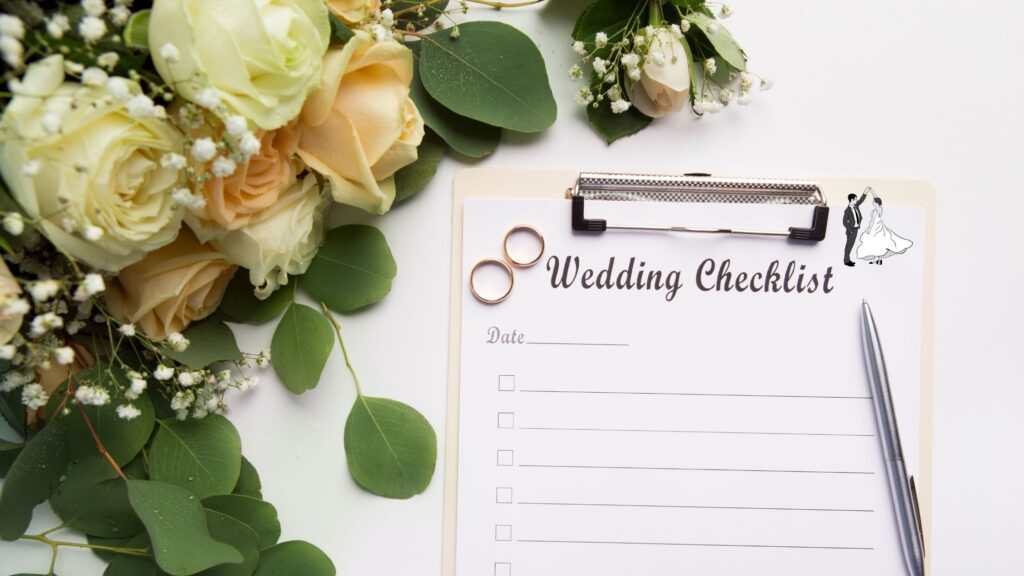Planning a wedding can be an overwhelming experience. There are many things to consider, like where to have the wedding, what to wear, and what to serve. With so much to do, it’s easy to forget something important. That’s why having a wedding checklist is crucial. A list makes sure that you don’t forget any essential details. This gives you peace of mind and lets you enjoy your special day without stress.
In this guide to planning a wedding in the UK, we’ve compiled a list of the top 10 things you can’t afford to forget. Whether you’re planning a traditional, modern, or destination wedding, this checklist will help you stay organised and on track. From choosing a venue and hiring vendors to select the perfect dress and accessories, our wedding checklist UK has you covered.
So, don’t let the stress of wedding planning get you down. Use our wedding planning guide to ensure you have everything for your big day. You can relax and enjoy your wedding day knowing that everything is covered with our wedding checklist.
1. Wedding Location:
Choosing the perfect location is one of the most critical decisions for your wedding.
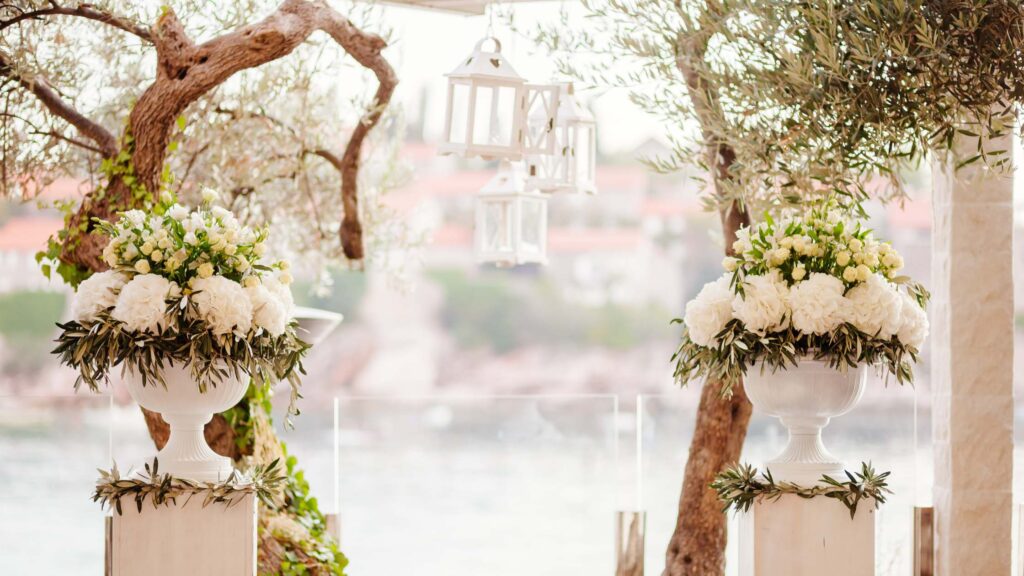
Here are some unique and popular wedding location suggestions:
1. Vineyards and wineries:
These locations offer stunning views and are perfect for couples who love wine and want a romantic, intimate setting.
2. Beaches:
A beach location can be attractive if you want a destination wedding. You can exchange vows with waves crashing in the background and enjoy a beautiful sunset.
3. Castles and historic buildings:
If you want a fairy-tale wedding, consider a castle or historic building. These locations provide a unique and elegant atmosphere that will make your special day feel magical.
4. Gardens:
A garden wedding can be attractive for couples who love nature. With lush greenery and beautiful flowers as your backdrop, you’ll feel like you’re in a fairy tale.
5. City rooftops:
If you’re a city-loving couple, consider getting married on a rooftop. This location will provide breathtaking views of the city skyline and make for a memorable wedding experience.
No matter what type of wedding you want, plenty of unique and beautiful locations exist. Just make sure to choose a location that fits your style and personality, and you’ll have a wedding you’ll remember for a lifetime.
2. Wedding Venues:
Picking the perfect location for a wedding is essential. Many other details, such as the wedding’s aesthetic, the number of guests you can invite, and the facilities at your disposal, will also depend on the location you choose for your big day.
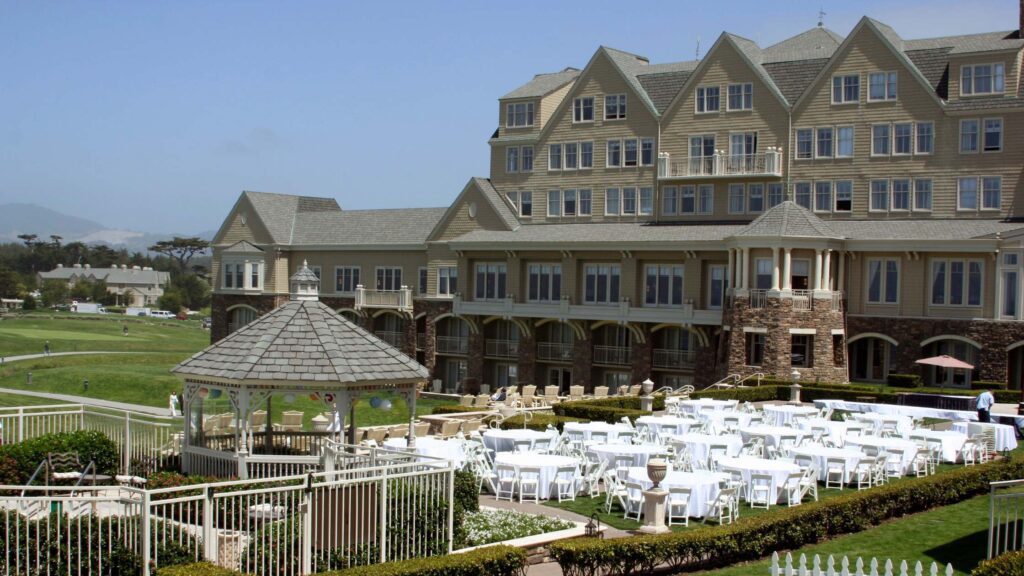
It’s essential to pick a site suitable for your event in terms of price and size. Therefore, it’s worth it to take your time doing so. When choosing a wedding venue, there are a few key things to keep in mind:
1. Budget:
The cost of the venue will likely be a significant factor in your decision, so it’s essential to have a clear idea of your budget and what you can afford.
2. Location:
Consider the venue’s location and where you and your guests will be coming from. Consider the surrounding area and what it offers regarding hotels, restaurants, and other attractions.
3. Size:
Ensure the venue is big enough to accommodate your guest list but not so large that it feels empty.
4. Amenities:
Does the venue have all the necessary amenities, such as restrooms, a kitchen, and parking?
5. Style:
Think about the style and theme of your wedding and choose a venue that complements it.
3. Wedding Guests & Invitations
Your wedding guests and invitations are an essential part of your big day. The guests you choose to invite will play a significant role in shaping the overall atmosphere and celebration of your wedding.
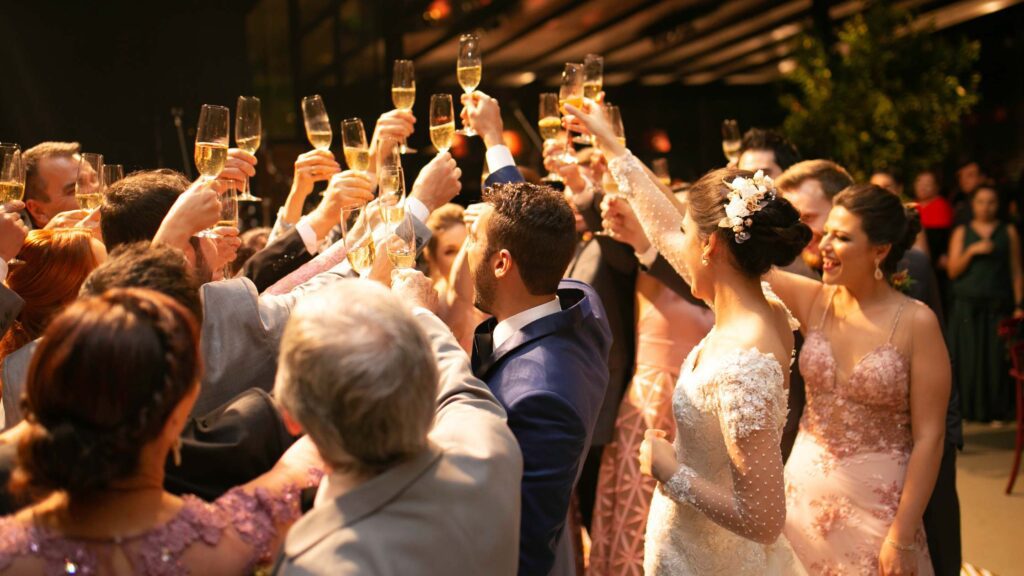
1. Rule of thumb
Regarding wedding invitations, sending them out too early or late can cause guests’ schedules and availability issues. A general rule of thumb is to send invitations 6-8 weeks before the wedding.
2. Include all necessary information
Ensure to include all necessary information on the invitation, such as the date, location, and time of the ceremony and reception. You may also have information about the dress code and other relevant details. It’s also important to consider any particular circumstances of your guests, such as dietary restrictions or accessibility needs.
4. Wedding Dress
The wedding dress is an iconic and vital part of any wedding ceremony. Not only is it a beautiful and sentimental symbol of the occasion, but it also serves as a critical element in the overall look and feel of the day.

When it comes to your wedding dress, there are a few essential things to remember.
1. Start shopping early:
It’s important to start shopping for your wedding dress as early as possible, ideally at least 9 to 12 months before the wedding date. It will give you enough time to find the perfect dress, alter it to fit you perfectly and make any necessary changes.
2. Set a budget:
Before you start shopping, you must set a budget for your wedding dress. It will help you narrow down your options and prevent you from overspending.
3. Consider your wedding style:
Your wedding dress should reflect the overall style and theme of your wedding. For example, opt for a flowy, lightweight dress if you’re having a beach wedding.
4. Think about the venue:
It’s important to consider where you’ll be getting married when choosing your dress. For example, if you’re getting married in a formal church, you may want to choose a more traditional gown.
5. Choose a silhouette:
Many wedding dress silhouettes include ballgowns, mermaids, A-line, and sheaths. Consider which silhouette will flatter your body shape and make you feel the most confident.
5. Wedding Rings
Wedding rings are a timeless and vital symbol of love and commitment. They are a visible representation of a couple’s vows and constantly remind them of their commitment to one another.

Regarding your wedding ring, there are a few important things to remember.
1. Decide on a budget:
Before shopping for wedding rings, decide on a budget you can afford. Wedding rings come in various materials, styles, and prices, so having a budget in mind can help narrow down your options.
2. Consider your lifestyle:
You will wear your wedding ring daily, so it’s important to consider your lifestyle when choosing a ring. If you work with your hands or engage in sports, consider a more durable and scratch-resistant material like tungsten or titanium.
3. Get the right size:
Ensure your finger is measured before purchasing a wedding ring to ensure it fits properly. Remember that your fingers may swell or shrink depending on the weather or other factors, so it’s a good idea to try on rings at different times of the day.
4. Order in advance:
Wedding rings often need to be ordered in advance, so give yourself enough time to get the rings you want. It’s a good idea to order your rings at least two to three months before your wedding date to ensure that they arrive on time.
5. Consider engraving:
Many couples have their wedding rings engraved with their names, initials, or a special message. Invest in the extra time and cost to engrave your rings.
6. Wedding Food & Drinks
Wedding food and drinks are a vital part of any wedding celebration. Not only do they provide nourishment for your guests, but they also have the potential to add to the overall atmosphere and enjoyment of the day.

1. Choose a catering style:
There are many catering styles, such as buffet, plated, family-style, and cocktail-style. Consider your venue, guest count, and personal preferences when choosing a catering style.
2. Plan a menu that accommodates dietary restrictions:
Make sure to offer various menu options that can accommodate dietary restrictions, such as vegetarian, gluten-free, or kosher. You can also include a note on the wedding invitation asking guests to indicate any dietary restrictions.
3. Offer a variety of drinks:
In addition to beer and wine, consider offering a signature cocktail or non-alcoholic options like mocktails or infused water. Make sure to have enough beverages for all guests throughout the event.
4. Coordinate with your venue:
If you’re having the wedding at a catering venue, coordinate with them to ensure the menu meets your needs and preferences. If you’re bringing in an outside caterer, ensure they have all necessary permits and approvals from the venue.
5. Remember the presentation:
How the food and drinks are presented can make a big impact. Consider adding decorations, garnishes, or special touches to make the food and drinks look and taste even better.
6. Plan for leftovers:
There will likely be leftover food and drinks after the wedding, so make sure to have a plan for handling and transporting them. Consider donating leftovers to a local charity or giving them to guests to take home.
7. Enjoy your food and drinks:
As the bride and groom, it’s easy to get caught up in the day’s excitement and forget to eat and drink. Make sure to take some time to enjoy your wedding food and drinks!
7. Wedding Planner
Hiring a wedding planner can be a valuable investment for your big day. A wedding planner is a professional who helps couples plan and executes all aspects of their wedding, from the venue and catering to the decorations and entertainment.
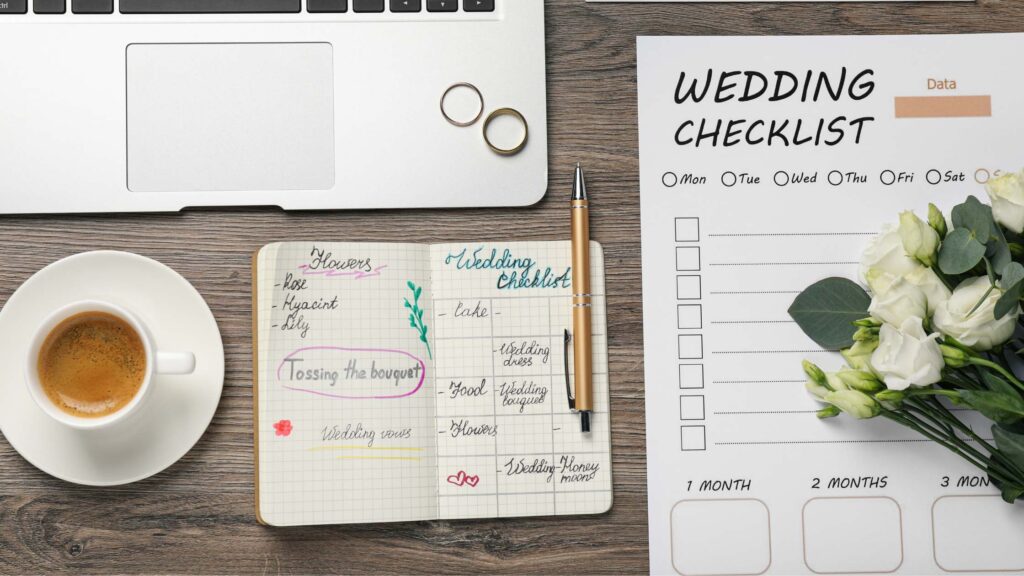
Benefits of hiring a wedding planner
1. Save time and reduce stress:
Planning a wedding can be overwhelming, especially if you do it alone. Hiring a wedding planner can help save time and reduce stress by handling the details and logistics of the wedding.
2. Benefit from professional expertise:
A wedding planner has experience and expertise in planning and can offer guidance and advice on everything from selecting vendors to creating a wedding timeline.
3. Please stick to your budget:
A wedding planner can help you create a realistic budget and stick to it throughout the planning process. They can also help negotiate prices with vendors and find cost-saving solutions.
4. Access to vendor networks:
Wedding planners often have established relationships with vendors, which can help you find the right ones for your wedding and potentially even get discounts.
5. Customization of your wedding:
A wedding planner can help you create a customized wedding that reflects your style and preferences and ensures every detail is executed flawlessly.
6. Coordination on the day of the wedding:
On the wedding day, a wedding planner will ensure that everything runs smoothly and according to plan. They can handle any last-minute issues and allow you to relax and enjoy your special day.
7. Assistance with wedding etiquette:
Wedding planners can offer advice, from sending invitations to creating a seating plan.
8. Troubleshooting:
If any problems arise during the planning process or on the wedding day, a wedding planner is equipped to handle them quickly and efficiently.
9. Creativity and inspiration:
A wedding planner can offer creative ideas and inspiration for your wedding, from unique décor to personalized details.
10. Peace of mind:
Hiring a wedding planner can provide peace of mind, knowing someone is there to take care of all the details and ensure your wedding day is everything you dreamed of.
8. Wedding Cake
A wedding cake can be an essential and valuable element of a wedding reception, providing symbolic importance and a delicious dessert option for guests.

There are a few reasons why wedding cakes have remained so popular over the years.
1. Symbolic importance:
The wedding cake symbolises the couple’s commitment to each other and their new life together.
2. Traditional element:
The wedding cake is a traditional element of the wedding reception and can add to the overall ambience and atmosphere.
3. Photo opportunity:
Cutting the wedding cake is a popular photo opportunity for the couple and their guests.
4. Dessert option:
The wedding cake can serve as a delicious dessert option for guests and be customised to suit individual tastes and preferences.
5. Design flexibility:
Wedding cakes come in various designs, from classic and elegant to modern and creative, and can be customised to fit the theme and style of the wedding.
6. Memorable experience:
Cutting and sharing the wedding cake is a memorable experience for the couple and their guests and can add to the overall enjoyment of the wedding reception.
7. Personalisation:
The wedding cake can be personalised with the couple’s names, dates, or other meaningful details, making it a unique and special element of the wedding day.
9. Wedding Photography
Wedding photography is an integral part of any wedding celebration. It captures the memories of your special day and allows you to relive the emotions and joy of the occasion for years to come.
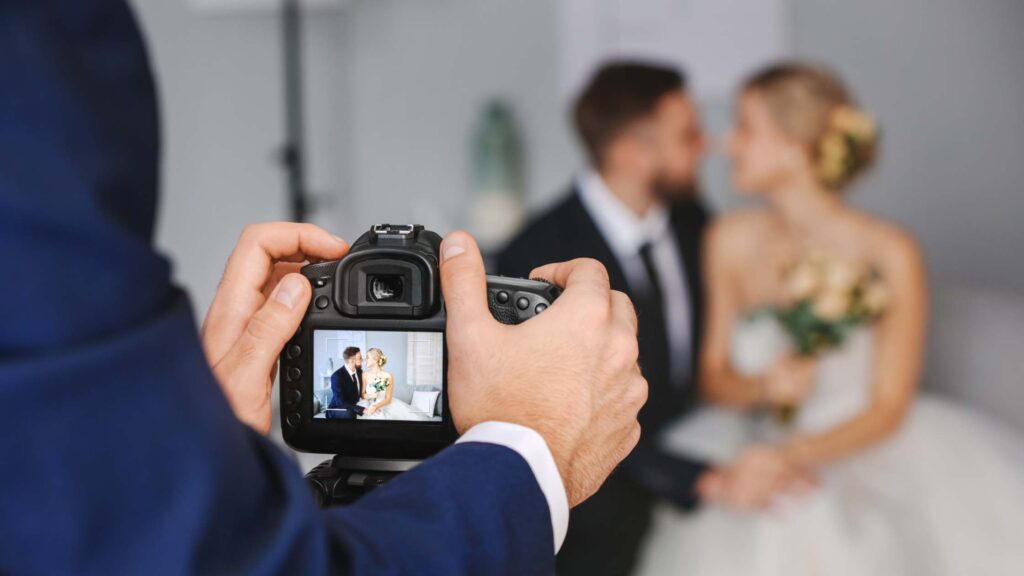
1. Captures memories:
Wedding photography is essential for capturing memories of the special day, from the ceremony to the reception.
2. Documenting the event:
Professional wedding photography can document and tell the wedding day’s story through photos.
3. Quality and creativity:
Professional photographers can provide high-quality and creative images that capture the emotions and atmosphere of the wedding.
4. Cherish for a lifetime:
Wedding photos are a keepsake the couple can cherish for a lifetime and share with family and friends.
5. Moments and details:
Wedding photography captures the big moments and small details, like the flowers and decorations, that help make the day special.
6. Attention to lighting and composition:
Professional photographers use lighting and composition to create stunning and memorable images.
7. Timeless and classic:
Wedding photography can be timeless and classic, ensuring the photos will be cherished for generations.
8. Investment for the future:
Investing in professional wedding photography can provide a lasting and valuable investment.
10. Wedding DJ
Hiring a wedding DJ can be an essential item on a wedding checklist, providing a valuable way to create a fun and memorable atmosphere for the reception and keep guests entertained and engaged throughout the event.
1. Creates atmosphere:
A wedding DJ can help set the mood and create a fun and festive atmosphere for the reception.
2. Music selection:
A professional wedding DJ can provide various music options and customize the playlist to fit the couple’s tastes and preferences.
3. Keeps guests entertained:
A wedding DJ can keep guests entertained and engaged throughout the reception with music, games, and other activities.
4. Smooth transitions:
A wedding DJ can help smooth transitions between different reception parts, such as the cocktail hour, dinner, and dancing.
5. Professional sound equipment:
A wedding DJ will have professional sound equipment and can ensure that the music is at the appropriate volume and quality.
6. Announcements and introductions:
A wedding DJ can make announcements and introductions, such as introducing the wedding party or announcing the first dance.
7. Experienced and reliable:
A professional wedding DJ will have experience in entertaining crowds and be reliable in showing up on time and delivering a great performance.
8. Memorable experience:
A great wedding DJ can create a memorable experience for the couple and their guests, ensuring the reception is a fun celebration.
Conclusion:
Planning a wedding can be overwhelming, but with a wedding checklist and careful consideration of essential elements, it can be a smooth and enjoyable process. From selecting the perfect venue and invitations to deciding on the food, drinks, and entertainment, each decision plays a crucial role in shaping your special day’s atmosphere and experience.
Staying organised and accurate to your budget, preferences, and needs is vital throughout the planning process. Doing so can create a meaningful, memorable, and exceptional wedding that reflects your love and commitment to each other. With some planning and attention to detail, your dream wedding is within reach.

